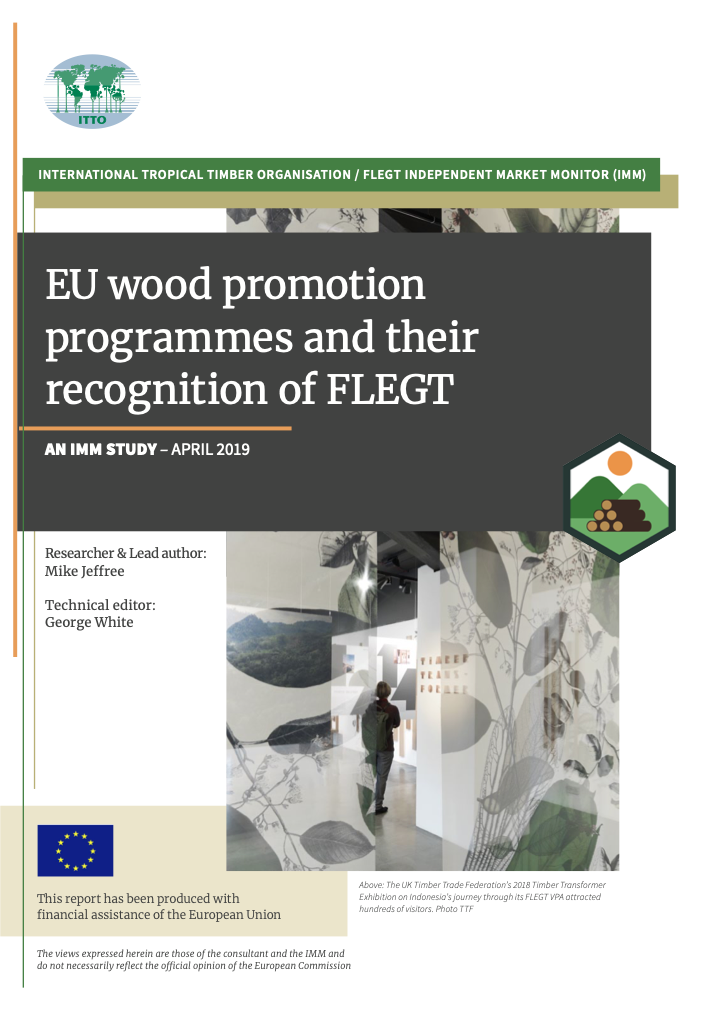EU wood promotion programmes and their recognition of FLEGT
DOWNLOADS
CATEGORY
Special Study
PUBLISHED DATE
April 2019
AUTHORS
Mike Jeffree, George White
EDITORS
Sarah Storck
DESCRIPTION
EU wood promotion programmes and their recognition of FLEGT
KEY FINDINGS
This study is based on a series of interviews and a literature survey conducted in the spring of 2019. In total twenty-five interviews were conducted across a range of EU member states and from a variety of perspectives – including wood promotional campaigns, timber trade federations, civil society organisations, companies and other industry commentators.
The study set out to:
- Provide an overview of private and public sector wood promotion campaigns targeting EU countries – specifically of campaigns focussing on tropical timber or on applications tropical timber is suitable for.
- Provide an overview of references to FLEGT-licensing and the VPA process by wood promotion campaigns targeting EU countries.
- Identify key themes of wood promotion campaigns targeting EU countries.
- Estimate the financial resources spent on promotion of FLEGT-licensed timber and the FLEGT VPA process and to contrast those to an estimate of resources spent on specific promotion of private sector third-party sustainable certified timber.
- Provide an overview of references to FLEGT-licensing and the VPA process in NGO / CSO lobby materials and guidance.
The study revealed that Europe’s timber and wood products sector has stepped up the level of its marketing and advertising activity and the clarity, cohesion and effectiveness of its communications in recent years.
It has developed a range of national and international marketing programmes and campaigns. In particular it has focused promotion and communications on timber’s environmental performance, in recognition that its key markets, notably construction, but also government decision makers are increasingly environmentally aware and informed and addressing climate change issues ever more urgently. Campaigns incorporate latest findings on wood’s carbon and climate mitigation benefits, its life cycle analysis performance in relation to competing man-made materials and its potential role in developing a circular, bio-economy.
There is also a stress on timber’s renewability and sustainability and the role sustainable forest management can play in maintaining the forest resource, with the carbon and biodiversity gains that entails. The stress here is very much on third-party forest and chain of custody certification as assurance that timber is sustainable.
Europe’s timber trade federations are involved in these wider promotion campaigns and also relay their messaging through their own communications channels. They also conduct their own campaigns and highlight the industry’s efforts to assure legality of timber placed on the European market and combat illegal logging, with the main focus in this area on the EU Timber Regulation and associated due diligence.
On promotion of FLEGT and FLEGT licensing, there is a central communications hub in the EFI FLEGT Facility, which continues to develop its content, strategy and outreach. The UK Timber Trade Federation ran an exhibition exclusively focused on FLEGT, a UK initiative supporting development of Indonesian FLEGT marketing strategies is underway and other trade federations do communicate the facts on FLEGT.
But otherwise its profile in industry promotion and marketing is low relative to third party forest sustainability certification. Europe’s two main tropical timber promotion campaigns, for instance, only commend sustainability certification as a procurement criterion, although they are seen to have potential to make the market more tropical timber-friendly generally and do not rule out more communication on FLEGT in the future.
The emphasis of NGOs in their forestry and timber sector campaigning is also sustainability and certification. There is, however, communication of FLEGT and some active advocacy in the sector.
Some in the European timber industry believe there is potential for raising FLEGT’s profile in communications and promotion further, given a more holistic approach. That includes greater emphasis on its wider social, environmental and economic impacts, but also a still greater trade focus, with more information on the actual products available with licences.
A note of caution sounded, however, is over what appetite there is in the timber sector and market for more communication of FLEGT while only Indonesia is issuing licences and only one major tropical timber importing EU country accepts a licence as proof of sustainability and legality under their procurement policy.
Another influence on the direction of wood promotion generally must be that rival materials sectors’ increasing communication of their environmental credentials, as this report shows, is focused very much on issues of sustainability, carbon and climate.
Recommendations arising from this report include:
- Provision of targeted materials to support existing timber promotion campaigns
- Increasing demand and recognition of FLEGT Licences by urging EU member state governments to accept FLEGT licences in their timber procurement policy
- Increasing availability in the EU market of FLEGT Licensed materials
- Developing materials that credibly demonstrate the impacts of the VPA process
- Researching, consulting widely and then clarifying the status of FLEGT Licensing compared to third party certification
- Empowering VPA signatory countries to lead the process of communicating VPA impacts

